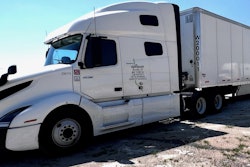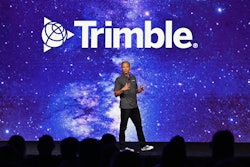Submitted by shippers and brokers, a FreightGuard report on carrier vetting platform Carrier411 helps identify unreliable or fraudulent carriers in the industry.
But what happens when a rating is false?
As a former freight broker, Sean Mathews had seen how carriers can be negatively impacted by inaccurate FreightGuard reports, ranging from potentially losing money or the ability to scale up, or even going out of business.
“Everyone’s focused on the fraud going to the freight broker, but what about the fraud coming back to the truck driver? There’s really nothing a trucking company can do, so there’s a power imbalance,” said Mathews.
Mathews recalls working with a trucking company owner whose identity was stolen and used for fraud. Although the owner proved his identity, his company still suffered due to an incorrect FreightGuard report left by brokers who had been deceived by the fraudster.
In some cases, Mathews said that small trucking companies can be extorted with a bad rating for money.
“We saw one truck driver try to collect money that was owed to him that was 90 days late on the invoice,” Mathews stated. “The freight broker just kept losing the check, and they did this to everybody. When the carrier tried to collect their money directly from the shipper, since that’s what the law says you can do, the freight broker punished them with a FreightGuard, and now that trucking company is out of money.”
Together with co-founders Dan Artaev and Aleks Bates, Mathews started Carrier Defender to protect carriers and most especially, small trucking companies, facing reputation issues, such as a false FreightGuard report.
Mathews said they’re trying to create a way for trucking companies to defend themselves. “We want to bridge the education gap because the average truck driver doesn’t know how to speak legal [terms], and they can’t fight back. That’s really the driving force of why we wanted to do this,” he said.
The company partnered with law firm Artaev at Law PLLC to offer in-house legal support with a money-back guarantee.
Once a case is accepted, the company and the client would agree on an escrow, depending on how many FreightGuard reports are involved. Currently, it’s around $2,000 per FreightGuard, which Mathews said they’ll take 60 days to work on. If after 60 days the report isn’t removed, the money would be returned to the client, wherein they can allocate those funds up to their discretion or choose to work with Carrier Defender’s network of lawyers.
Compared to other players in the market, Mathews explained that providing in-house legal support and a money-back guarantee are their distinctive offering. “We’ve noticed that there’s some other folks out there that try to do what we do, but don’t offer that. So, if a trucker uses that service and it doesn’t work, they lose all that money. And a trucker doesn’t have the funds to just waste on something that doesn’t work,” Mathews said.
Dan Artaev, General Counsel for Carrier Defender, noted that while traditional law firms would require high fees and time, they want to offer a cost-effective alternative. “There’s a lack of products and solutions for smaller carriers that are facing these kinds of issues. It’s not always economically feasible to hire a lawyer for everything,” he said.
Self-funded by the co-founders, Mathews said they have been working on the business since February of this year. With its minimum viable product, the company helped a carrier who used other solutions in the market that did not work.
“We’ve actually had a lot of positive feedback,” Artaev said. “We have several cases in progress right now in all stages. I think the industry has been very receptive to this approach to solving a real problem.”
He added, “Online reputation is a big problem and it disproportionately affects smaller carriers the most.”
Launched in August, the business model is on a project or a per-level basis. In a few months, they plan to do a subscription model wherein companies can retain their services.
However, Mathews said while they want to help trucking companies with a FreightGuard report, they can’t help companies that are at fault. Mathews explained, “We don’t need another law firm to jump and start helping the wrong players. We really want to identify ourselves as [a platform that is] really helping the folks who don’t deserve those reports.”
The company’s due diligence process includes verifying the complaint, proof of delivery, rate confirmations and other documentation. “The case needs to have some merit for us to work on because if there is no merit, it’s going to be impossible,” Mathews said.
Besides going against inaccurate FreightGuard reports, Mathew said they want to grow into other areas in reputation management too, as well as other issues that carriers face.
Artaev highlighted the issue of brokers short-paying carriers and just unilaterally withholding payments for various reasons. According to Artaev, these disputes are often too minor and costly to pursue through breach of contract litigation, yet the significantly affect carriers — an area they aim to address in the future.











